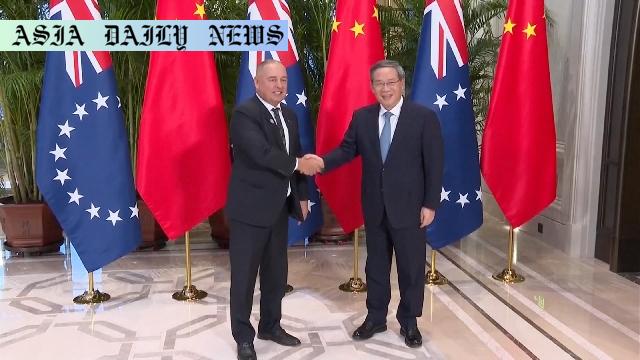Cook Islands deepened ties with China through a significant collaboration agreement, sparking diplomatic tensions with New Zealand.
Cook Islands signs cooperation deal with China covering trade, investment, and climate change.
New Zealand expresses concern due to lack of consultation, highlighting its political ties with the Cook Islands.
The deal showcases China’s influence in the South Pacific, raising geopolitical tensions.

Introduction to the Cook Islands-China Partnership
The Cook Islands, a small nation in the South Pacific, recently made international headlines by deepening its bilateral ties with China. Prime Minister Mark Brown’s state visit to Beijing marked a monumental step toward enhancing cooperation in various areas, including trade, investment, infrastructure, and climate change. The agreement signifies a bold move for the Cook Islands as the nation seeks diversified partnerships and greater economic growth opportunities.
Highlights of the Agreement
This new partnership covers several areas critical to the Cook Islands’ development. China has committed to supporting the islands through initiatives targeting trade expansion, infrastructure improvement, and climate-change mitigation—a significant need for Pacific island nations. The deal symbolizes growing Chinese involvement in the South Pacific, a region historically dominated by Western nations such as New Zealand and Australia. While specifics of the agreement remain undisclosed, its focus on development hints at long-term collaboration.
Diplomatic Tensions with New Zealand
The Cook Islands’ relationship with New Zealand is unique, given their free-association arrangement and shared history. New Zealand provides defense and security to the Cook Islands, and the two nations typically consult on significant matters of foreign policy. However, Prime Minister Mark Brown’s decision not to consult New Zealand before formalizing the agreement has caused friction. New Zealand Foreign Minister Winston Peters expressed substantial concern, emphasizing the importance of maintaining open communication.
New Zealand’s Concerns on Regional Stability
New Zealand’s response is tied to broader concerns about China’s increasing presence in the Pacific. Over the past few years, several Pacific nations, including the Solomon Islands and Kiribati, have shifted alliances to strengthen diplomatic ties with Beijing. These moves are often accompanied by economic aid agreements, giving China a growing foothold in the region. New Zealand views this expansion with unease, fearing it could undermine traditional partnerships and destabilize geopolitical arrangements in the Pacific.
Cook Islands’ Perspective on the Deal
Prime Minister Mark Brown has defended the agreement, asserting that the collaboration with China complements, rather than compromises, the Cook Islands’ long-standing relationship with New Zealand. Brown emphasized the importance of balancing existing alliances while pursuing new opportunities for the country’s development. The Cook Islands, home to only 17,000 inhabitants, aims to ensure economic stability and infrastructural growth through diversified international partnerships.
Implications for the Pacific Region
This development is a microcosm of wider geopolitical pressures in the Pacific. With China expanding its influence, Pacific nations find themselves navigating complex relationships between traditional Western allies and a resource-rich Beijing. While nations like the Cook Islands benefit from increased investment, the long-term ramifications of Chinese involvement remain uncertain.
A Delicate Geopolitical Balance
As the Cook Islands seeks to leverage its partnership with China, it must tread carefully to ensure its autonomy and prevent potential dependency. The agreement underscores the fierce competition between global powers in the Pacific, making regional diplomacy increasingly intricate. For New Zealand and its allies, this event serves as a wake-up call to more actively engage with Pacific nations and address their needs proactively.
Conclusion
As diplomatic dynamics in the Pacific evolve, the Cook Islands’ agreement with China is a significant indicator of shifting alliances and strategies. Balancing traditional relationships with emerging partnerships will be critical for small nations navigating these turbulent waters. For New Zealand, this underscores the need for continued dialogue and collaboration to maintain its influence in the region.



Commentary
The Complex Chessboard of Pacific Geopolitics
The Cook Islands’ decision to deepen ties with China is emblematic of a broader reconfiguration in Pacific geopolitics. For years, the Pacific island nations have relied heavily on traditional allies like New Zealand and Australia for economic aid and political guidance. However, China’s growing influence in the region is providing these nations with alternatives, sparking both opportunities and challenges.
A Strategic Choice by the Cook Islands
For the Cook Islands, strengthening ties with Beijing is a pragmatic decision focused on economic development and the urgent need to address climate change. China’s ability to provide substantial investment and resources is a tempting proposition for small nations seeking sustainable growth. However, this raises important questions about the balance of power and how such alliances may impact the Cook Islands’ autonomy in global decision-making processes.
The Role of Traditional Allies
New Zealand’s concerns, while valid, showcase a potential oversight in its regional approach. By not actively engaging with nations like the Cook Islands on emerging issues, traditional powers risk alienating long-standing allies. The Cook Islands’ reassurance that this new deal is not replacing its relationship with New Zealand should prompt reflection and a recalibration of regional strategy by Western allies.
Future Considerations
This evolving situation is a reminder of the complex interplay of relationships in the Pacific. Cooperation with China can bring tangible benefits but also carries risks if not managed effectively. For the Cook Islands, seeking a balance amid competing interests will define its trajectory in regional and international affairs. For other Pacific nations, this development sets a significant precedent in navigating a world increasingly shaped by geopolitical competition.